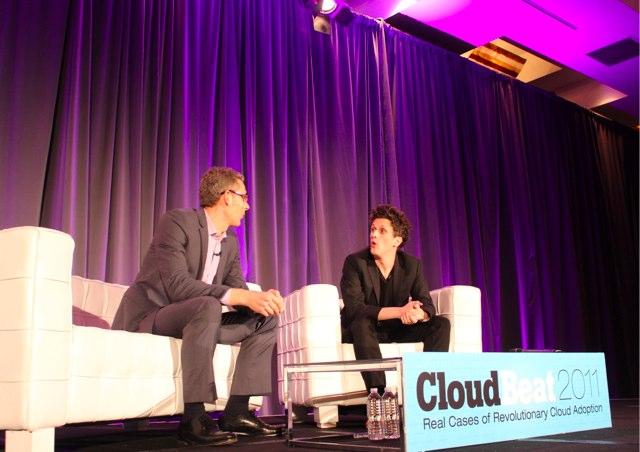Aaron Levie, the dynamic co-founder and chief executive of cloud-based file sharing company Box (until recently known as Box.net) doesn’t hold back when it comes to his competitors.
“If [Microsoft] Sharepoint happened to work, that’s what we kind of do,” said Levie at the 2011 CloudBeat conference.
Box claims about 77 percent of the Fortune 500 as its customers, though admittedly the integration is mostly department-wide, as opposed to company-wide. Proctor and Gamble, however, made a difference for the already successful company. P&G realized it had to do something different with its IT strategy, and Box stepped in. Like many of the Fortune 500 companies, P&G also started with a single department: Pampers.
“We brought diapers to the internet,” Levie jokes. “It was bottoms up.”
It was the start of large-scale adoption for Box. You have end-users who need a good interface, and then you have IT managers who need deep tools to control and, in essence, squeeze the file sharing software for all it’s worth. In order to stay afloat, cloud companies — particularly file sharing ones — need to develop for both kinds of customers. That’s what people in the industry refer to as the “consumerization of IT,” the ability to cater to both.
Levie’s company has had the good fortune to take advantage of a major shift in the way companies do business. According to Levie, there’s a shift away from the vertically-integrated company, like Apple, towards companies that specialize on the core parts of their business and spin off or outsource everything else.
“We think the world is moving away from the integrated vertical stack,” said Levie. “It drives complacency and cost increases.”
That plays well to Box’s strengths, since it can offer IT services that aren’t core to most companies’ businesses.
Perhaps more important than complacency is the fact that these vertical giants are starting to get more distracted due to the breadth of their offerings. Levie reminisced on venture capitalists in 2008 asking him, “Shouldn’t Microsoft just own collaboration in the enterprise?” And while at the time the answer was yes, today the leadership has changed hands to cloud startups with more focus, he said.
“Microsoft is so far behind that it’s not even relevant to talk to them,” Levie said.
Indeed, even Google is missing the mark.
“The best thing that ever happened for us is that Google got really distracted by the social networking wars,” said Levie. “They have not invested in enterprise offers as much as they could have, and I think that has left a massive amount of opportunities for startups.”
Box itself has seized on these growth opportunities. Recently, the company received an $81 million follow-on round that valued the cloud company at $600 million. Box announced its developer network titled /bin, or the Box Innovation Network, in addition to finally completing one of its hardest quests: Purchasing the box.com domain name and dropping “.net” from its own name.
Currently, the company has over 300 employees and has its sites on international expansion for the next year. International customers amount to about 20 percent of Box’s customers and 50 percent of its traffic.



